|
|
|
Sort Order |
|
|
|
Items / Page
|
|
|
|
|
|
|
| Srl | Item |
| 1 |
ID:
130617


|
|
|
| 2 |
ID:
149642
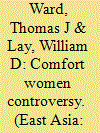

|
|
|
|
|
| Summary/Abstract |
During the World War II, up to 200,000 women, the majority of whom were Korean, were forced to provide sex to Japan’s military forces. The perceived refusal of Japan to fully take responsibility for the mistreatment of these “comfort women” has been a major obstacle to Japanese-Korean relations for a quarter of a century. Although the signing of the December 28, 2015 Agreement between Japan and Korea purported to “finally and irreversibly” solve the comfort women issue that has divided these two East Asian powers, the voices of Korean and Korean-American civil society indicate the contrary. American local, county, and state governments have become key battlegrounds in the conflict. As comfort women memorials across the USA proliferate, these governmental entities have allowed themselves to be caught up in incomplete narratives, whether Japanese or Korean. Against the backdrop of the tense geopolitics of today’s Asia-Pacific, a more responsible, comprehensive inquiry is needed to bring closure to a tragic chapter of human history.
|
|
|
|
|
|
|
|
|
|
|
|
|
|
|
|
| 3 |
ID:
174817
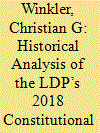

|
|
|
|
|
| Summary/Abstract |
In 2018 Japan’s Liberal Democratic Party announced four new proposals to amend the seven-decades-old and thus-far unamended constitution of Japan. These include adding a third paragraph to Article 9, as well as state-of-emergency provisions, support for students in need, and changes to the electoral system. By analyzing each proposal’s place in the debate on amendments dating back to the 1950s, I show that these very different proposals share one important feature that sets them apart from recent drafts aiming for wholesale reform of the constitution: they are relatively minimalist in nature. This new modesty is due to the necessity to win over other parties and voters, but it is also an attempt to cement rather than to change the LDP-made status quo.
|
|
|
|
|
|
|
|
|
|
|
|
|
|
|
|
| 4 |
ID:
137147
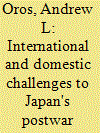

|
|
|
|
|
| Summary/Abstract |
Japan today is widely portrayed as on the verge of a significant identity shift that could lead to dramatic new security policies. Yet, Japan's first formal national security strategy, adopted in December 2013, proclaims repeatedly Japan's long-standing ‘peace-loving’ policies and principles. Why does a conservative government with high levels of popular support not pursue policies more in line with views widely reported to be central to its values and outlook? The answer lies in Japan's long-standing security identity of domestic antimilitarism, an identity under siege to a degree not seen since its creation over 50 years ago, but – as evidenced in Japan's new national strategy document – one that continues to shape both the framing of Japan's national security debates and the institutions of Japan's postwar security policy-making process. Relational approaches to identity construction illuminate challenges to Japan's dominant security identity, but a focus on domestic institutions and electoral politics offers the best course for modeling identity construction and predicting its future resilience.
|
|
|
|
|
|
|
|
|
|
|
|
|
|
|
|
| 5 |
ID:
168514
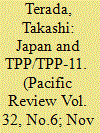

|
|
|
|
|
| Summary/Abstract |
Based on the neoclassical realism approach, this article aims to clarify factors conducive to Japan’s different roles in both participating in the trans-pacific partnership (TPP) and concluding the TPP-11 by focusing on how the US’s distinctive attitudes towards the TPP under the Obama and Trump administrations influenced Japan’s changing approaches. During the Obama administration, which needed Japan’s participation to expand the TPP in the face of China’s growing global and regional economic influence, Japan incorporated the TPP into its growth strategy and committed itself to sustaining US leadership during TPP negotiations by making necessary concessions on both the international and domestic fronts. By contrast, the Trump administration, with its strong propensity for bilateral deals to counter China’s bid for global economic hegemony with the TPP withdrawal urged Japan to change its reactive stance and take a proactive role in TPP-11 negotiations. This article opens a ‘black box’ of the political system under the second administration of Shinzo Abe, and demonstrates the strengthened function of the Prime Minister’s Office and Cabinet Secretariat or Kantei within the centralised trade policy-making apparatus as key mechanisms contributing to a departure from the traditional features that occasionally hampered Japan’s foreign economic policy initiatives.
|
|
|
|
|
|
|
|
|
|
|
|
|
|
|
|
| 6 |
ID:
152246
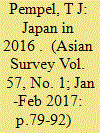

|
|
|
|
|
| Summary/Abstract |
Japanese domestic politics, foreign policy, economics and society continued along well-established paths in the year 2016. And long-term demographic trends remained a major unresolved challenge. Yet three exceptions to continuity stood out: first, controversial legislation that expanded the legality of collective self-defense; second, the likely collapse of the Trans-Pacific Partnership (TPP); and third, the election of Donald Trump.
|
|
|
|
|
|
|
|
|
|
|
|
|
|
|
|
| 7 |
ID:
164948
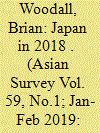

|
|
|
|
|
| Summary/Abstract |
New and old domestic issues challenged the Abe government, while “Trump shocks” rattled Japan’s foreign relations. Domestically, Abenomics produced mixed results, the depopulation bomb continued ticking, and Abe’s reelection presaged a possible attempt at constitutional amendment.
|
|
|
|
|
|
|
|
|
|
|
|
|
|
|
|
| 8 |
ID:
172460
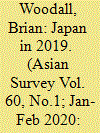

|
|
|
|
|
| Summary/Abstract |
In 2019, Japanese Prime Minister Abe grappled with domestic dilemmas and diplomatic strains, highlighted by inflamed relations with South Korea. The economy continued to grow slowly, the depopulation bomb continued ticking, and demands for gender equality grew louder. The year also brought the enthronement of a new emperor and genesis of a new imperial era.
|
|
|
|
|
|
|
|
|
|
|
|
|
|
|
|
| 9 |
ID:
179242
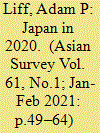

|
|
|
|
|
| Summary/Abstract |
Japan’s leaders began 2020 with grand ambitions to make it a historic year. Tokyo was set to welcome the world for the Summer Olympics, Japan’s first since 1964, and Abe Shinzō, the powerful prime minister, planned to realize his party’s 65-year-old dream: revising Japan’s never-amended, US-drafted 1947 constitution. By spring, however, it was clear that COVID-19 had other plans. Despite public health outcomes better than in any other G7 member, daily life was severely disrupted, and the domestic political and economic fallout for Japan was significant. By late summer, circumstances were improving, but both Abe’s popularity and his personal health had suffered. He resigned in September, ending the longest prime-ministership in Japanese history. Though COVID-19 and the end of the Abe Era were the major storylines of Japan in 2020, a subplot was, paradoxically, remarkable continuity in national politics and foreign affairs.
|
|
|
|
|
|
|
|
|
|
|
|
|
|
|
|
| 10 |
ID:
177668
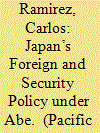

|
|
|
|
|
| Summary/Abstract |
Using Samuels’ [(2007). Securing Japan: The current discourse. The Journal of Japanese Studies, 33(1), 125–152] political categories of Japanese perspectives on strategic policy, this article argues that the nation’s foreign and security policy under the leadership of Prime Minister Shinzo Abe has undergone three distinct phases: a first phase of neoconservatism during his first tenure as Prime Minister from 2006 to 2007; a second period when he returned to the office of Prime Minister five years later in 2012 that can be described as neoautonomous; and a third phase of pragmatic realism from 2015 to 2016. In addition, this article analyses the factors driving change from one phase to another. By adopting an eclectic approach to theory, it claims that each traditional theory in the field of International Relations (IR) offers different but complementary causal effects to shifts in security and foreign policies. Each IR theory emphasizes or downplays these four factors: actors, structures, material forces and ideas. This article will employ all three IR traditional theories as they relate to these factors to discern the change factors of Abe’s foreign policy. Finally, it concludes by siding with those scholars who assert that Japan’s foreign policy has made a consequential break from its past and has embarked on a new path towards a remilitarization of its foreign and security policy.
|
|
|
|
|
|
|
|
|
|
|
|
|
|
|
|
| 11 |
ID:
131393


|
|
|
|
|
| Publication |
2014.
|
| Summary/Abstract |
This article explores the role of nationalism in domestic politics in Japan since 2005 by contrasting the Koizumi and the Abe administration of 2012/2013. It argues that the Koizumi and Abe administrations have exploited nationalism as a means to consolidate political power, move away from faction-based politics toward populism-based politics to weaken factions within the political system with entrenched interests that are counter to or prevent bolder, necessary economic reforms to propel Japan out of 20 years of economic stagnation. Furthermore, this article demonstrates that while each politician has used nationalism to mobilize popular support for their respective administrations, Koizumi's use of nationalism was to achieve an economic agenda while Abe's use of nationalism has been used to achieve his political agenda which includes constitutional reform.
|
|
|
|
|
|
|
|
|
|
|
|
|
|
|
|
| 12 |
ID:
160453
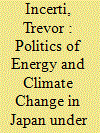

|
|
|
|
|
| Summary/Abstract |
Under what we call Abenergynomics, Japanese Prime Minister Abe Shinzō has used energy policy to support the growth objectives of Abenomics, even when the associated policies are publicly unpopular, opposed by utility companies, or harmful to the environment. We show how Abenergynomics has shaped Japanese policy on nuclear power, electricity deregulation, renewable energy, and climate change.
|
|
|
|
|
|
|
|
|
|
|
|
|
|
|
|
| 13 |
ID:
161561
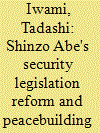

|
|
|
|
|
| Summary/Abstract |
Recent literature on Japanese foreign policy has focused on analysing the implications of Prime Minister Shinzo Abe's security legislation reform for the bilateral security alliance relationship with the US amidst a rising China and the right to collective self-defence. Its impact on Japan's multilateral security policy, in particular, peacebuilding, has so far received little attention. In what ways and to what extent does Japan play a peacebuilding role under this change? This article examines key implications of the security legislation reform, along with the renewal of Japan's Official Development Assistance charter, for its peacebuilding efforts. By taking Mindanao, the Philippines, as a case study, it argues that Abe focuses on taking a foreign aid-centred approach while showing little interest in sending Japanese Self-Defence Force. This article provides a counter-narrative to the claim that Japan is taking a more assertive approach to international security. Abe is more risk-averse as far as his approach to peacebuilding is concerned.
|
|
|
|
|
|
|
|
|
|
|
|
|
|
|
|
|
|
|
|
|